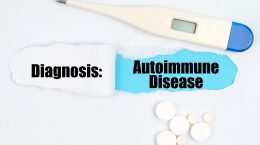Published on June 2, 2022
Video Friday: Dr. John Campbell reviews findings from the VITAL trial showing vitamin D reduced the incidence of autoimmune disease by 22%
Key Points
- Autoimmune disease (when the immune system attacks its own tissues) is caused by too much inflammation and abnormal immunity
- The VITAL study used 2000 IU/day vitamin D or placebo, with 1000 mg/day omega-3s or placebo; it found that those taking vitamin D had a 22% reduction in autoimmune disease in those taking vitamin D versus placebo. There was a 39% decreased incidence of diagnosed autoimmune disease among those taking vitamin D vs placebo, when diagnosis during the first 2 years was excluded (allowing time for vitamin D to take effect).
- “The clinical importance of this trial is high because these are well tolerated, non-toxic supplements, and other effective treatments to reduce the incidence of autoimmune diseases are lacking”
 The VITAL trial was a recent, randomized, double blind, placebo-controlled clinical trial conducted in multiple centers around the United States. It included 25,871 participants who were free of cancer and cardiovascular disease diagnoses at baseline. Participants were either male, ages 50 years and older, or female, ages 55 years and older, who were given 2000 IU vitamin D per day and 1 gram of marine omega-3 fatty acids per day, or placebo. The average vitamin D level at baseline among all participants was about 30 ng/ml (75 nmol/L).
The VITAL trial was a recent, randomized, double blind, placebo-controlled clinical trial conducted in multiple centers around the United States. It included 25,871 participants who were free of cancer and cardiovascular disease diagnoses at baseline. Participants were either male, ages 50 years and older, or female, ages 55 years and older, who were given 2000 IU vitamin D per day and 1 gram of marine omega-3 fatty acids per day, or placebo. The average vitamin D level at baseline among all participants was about 30 ng/ml (75 nmol/L).
Initial findings from the VITAL trial were published in November of 2018; one paper compared cancer outcomes between those assigned to vitamin D (2000 IU/day) versus placebo. When cancer outcome results were analyzed excluding the first two years after study initiation (allowing time for vitamin D to have an effect), there was a 25% reduced risk of cancer mortality among those taking vitamin D (p=0.02). When taking BMI into consideration the reduction in cancer was more pronounced. A significant reduction of metastatic or fatal cancer was seen among those with a normal BMI, with a decreased risk of 38% among those taking vitamin D compared to placebo (p=0.004).
A new analysis from data gathered during the VITAL trial looked at the relationship between supplementation with vitamin D and/or omega-3 fatty acids and the incidence of autoimmune diseases. The primary outcome studied was the total incidence of all autoimmune diseases. Probable diagnoses of autoimmune diseases (cases that lacked enough medical record data to confirm existing symptoms and evidence of autoimmune disease) was also tracked and reported on.
Vitamin D Decreased Autoimmunity: Video Review of Findings
In the video below, Dr. John Campbell reviews the findings from the VITAL trial showing that those who supplemented with vitamin D had a 22% reduced incidence of autoimmune disease.
Video Key Points
Vitamin D regulates a wide array of genes, inflammation, and both acquired and innate immune responses
Autoimmune disease (when the immune system attacks its own tissues) is caused by too much inflammation and abnormal immunity
Some cheap or even free ways to promote and optimize health include using sensible sunshine exposure, vitamin D supplementation, and other non-pharmacological options
The VITAL study used 2000 IU/day vitamin D or placebo, with 1000 mg/day omega-3s or placebo; it found that those taking vitamin D had a 22% reduction in autoimmune disease in those taking vitamin D versus placebo
The population as a whole is low in vitamin D, with widespread deficiency; in fact, almost 90% of U.S. adults in the NHANES data set have a vitamin D level below the recommended range of 40-60 ng/ml
The effect of vitamin D supplementation on reducing the risk of autoimmune disease took a few years to show, and it is possible the study may have seen a bigger effect over a longer period of time; in fact, analysis showed that there was a 39% decreased incidence of diagnosed autoimmune disease among those taking vitamin D vs placebo, when diagnosis during the first 2 years was excluded (allowing time for vitamin D to take effect)
There was a 15% decreased incidence of diagnosed autoimmune disease among those taking omega-3 fatty acids vs placebo, but this result was not statistically significant
“The clinical importance of this trial is high because these are well tolerated, non-toxic supplements, and other effective treatments to reduce the incidence of autoimmune diseases are lacking”
Individuals may also want to consider taking vitamin K2
Types of Autoimmune Diseases
- Rheumatoid arthritis
- Polymyalgia rheumatica
- Hashimoto’s thyroiditis (too little thyroid hormone)
- Psoriasis
- Type 1 diabetes mellitus
- Multiple sclerosis
- Lupus
- Inflammatory bowel disease (Crohn’s Ulcerative colitis)
- Addison’s (too little of cortisol)
- Grave’s (too much thyroid hormone),
- Myasthenia gravis
- Pernicious anemia
- Autoimmune vasculitis
- Celiac disease (gluten protein from grains)
With autoimmune disease being the third leading cause of morbidity in the industrialized world – as Dr. Campbell states, “Prevention is better than a cure!”
Ensure Healthy Vitamin D Levels – Measure at Home Today
 Having and maintaining healthy vitamin D levels and other nutrient levels can help improve your health now and for your future. Choose which additional nutrients to measure, such as your omega-3s and essential minerals including magnesium and zinc, by creating your custom home test kit today. Take steps to improve the status of each of these measurements to benefit your overall health. With measurement you can then determine how much is needed and steps to achieve your goals. You can also track your own intakes, symptoms and results to see what works best for YOU.
Having and maintaining healthy vitamin D levels and other nutrient levels can help improve your health now and for your future. Choose which additional nutrients to measure, such as your omega-3s and essential minerals including magnesium and zinc, by creating your custom home test kit today. Take steps to improve the status of each of these measurements to benefit your overall health. With measurement you can then determine how much is needed and steps to achieve your goals. You can also track your own intakes, symptoms and results to see what works best for YOU.
Enroll in D*action and Test Your Levels Today!





